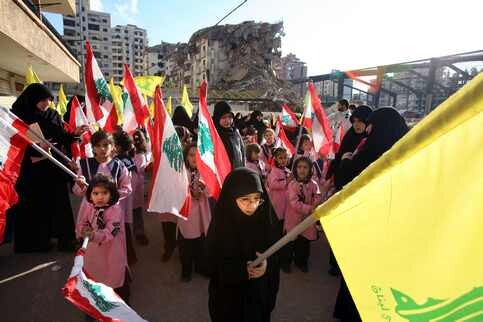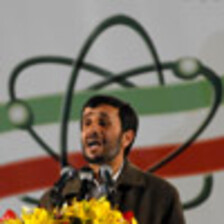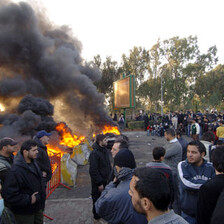IPS 15 December 2006

Young female Hezbollah supporters marching during a rally in the ruins caused by Israeli bombardment in southern Beirut, to commemorate ‘Jerusalem day’, 6 October 2006. (Manoocher Deghati/IRIN)
JERUSALEM, Dec. 15 (IPS) - An Iranian and Syrian satellite, Hezbollah operating unfettered, and the Israeli army ceasing to patrol the south — that is the fate Israeli leaders fear could befall Lebanon if anti- government forces succeed in ousting the elected government of Prime Minister Fouad Siniora.
“What concerns us is that the parties trying to get power in Lebanon are the ones who obey Iran and Syria,” former deputy defence minister and Labour Party lawmaker Ephraim Sneh told IPS. “The ambition of the Iranian regime is territorial contiguity from the border of Afghanistan to the Mediterranean. Taking over Lebanon by proxy and turning it into an Iranian satellite is one means of achieving this.”
For two weeks, anti-government protestors have camped outside the parliament building in Beirut, insisting that the demand of the Hezbollah-led opposition for veto power in the cabinet be met.
“If Hezbollah wins veto power, it will essentially mean that the Lebanese government will be a proxy of Syria and Iran,” Shmuel Bar, director of studies at the Institute for Policy and Strategy, located near Tel Aviv, told IPS. “Hezbollah will determine what happens (in the government).”
Both Iran and Syria back the Shia organisation, which has accused Siniora and his government of being U.S. lackeys. But the anti-Syrian forces in Lebanon — Sunnis, Druze and some of the Christian groups — who have the backing of Europe and the U.S., charge that the opposition is trying to overthrow the government as part of a bid to undermine plans for an international tribunal that will try those accused of involvement in the assassination of former Lebanese prime minister Rafik Hariri. The former PM was killed by a truck bomb in February 2005.
Among the suspects are four Lebanese generals who were considered close to Syria, further fueling claims by many Lebanese that Damascus orchestrated Hariri’s murder.
Syria, which has denied any role in the killing, opposes the tribunal and fears that United Nations investigators probing the assassination will discover links between Syrian officials and Hariri’s assassins. The killing of the Lebanese prime minister sparked huge demonstrations which, combined with international pressure, forced Syria to end its 29- year occupation of Lebanon.
The Lebanese government’s efforts to advance the plan for a tribunal — based on a United Nations draft agreement — has brought tensions in Lebanon to boiling point. On Nov. 11, all Shia ministers resigned in protest over the tribunal, and declared the government illegitimate.
“This is a moment of truth,” says Bar. “For the Sunnis, Christians and Druze, acceding to Hezbollah’s demand (for veto power) would be a crossing of the Rubicon, especially after the battle they waged to get the Syrians out of Lebanon.”
While Siniora spent over a week in his office, protected by troops and barbed wire, as thousands of anti-government demonstrators remain camped outside, some observers believe that the parties to the conflict will ultimately step back from the brink, preventing a descent into violence.
Bar is less confident: “As long as Siniora has international backing, I don’t see him giving in,” he says. “But the longer this situation continues, the greater danger there is that it will spiral into a civil war. If this happens, Syria can claim that it has to interveneÓand Iran will be able to strengthen its presence in Lebanon.”
Israeli observers fear that if the Siniora government crumbles, the situation in south Lebanon will revert to that which existed prior to Israel’s offensive in the summer against Hezbollah, when the Shia organisation controlled the south and was able to operate unfettered in deploying thousands of rockets in the area, many of which it fired into northern Israel.
“The moment Hezbollah can influence the decisions of the Lebanese government, it will influence the orders of the Lebanese Army in the south,” says Sneh. “That will have direct implications for our security.”
For six years, from the time Israel unilaterally withdrew from a buffer zone it occupied in south Lebanon in May 2000, Hezbollah’s control of the area was unchallenged. But since the fighting in the summer, and in line with United Nations resolution 1701 which ended the hostilities, the Lebanese Army has deployed in the south, along with an international peacekeeping force.
“For the time being, the Lebanese Army is trying to maintain Lebanese sovereignty in the south and is not allowing another force to carry weapons there,” says Sneh. “They are doing this along with the UN forces. But we’re concerned that Hezbollah may regain the status it had before the war.”
Neither Sneh nor Bar believe Israel should try to influence developments in Lebanon. Past Israeli efforts to engineer political change in Lebanon — like that of then defence minister Ariel Sharon during the Lebanon War in 1981 — have ended in disaster. “We don’t intervene in domestic Lebanese politics,” says Sneh. “We’re not indifferent, but we do not interfere.”
Bar believes that approach could change if the current Lebanese government is toppled. “For now, Israel is avoiding carrying out operations in Lebanon because of Siniora,” he says. “There is some form of ceasefire in existence and we don’t want to undermine the Siniora government.”
But, he adds, if Hezbollah essentially takes control of the government, Israel “will cast off these self-imposed shackles.”
All rights reserved, IPS - Inter Press Service (2006). Total or partial publication, retransmission or sale forbidden.
Related Links





